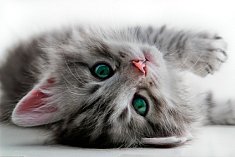|
Feline Seizure: Causes, Signs, Treatments

Feline seizures can be very scary for both you and your feline friend. Although rare in cats, seizures are the most common neurological condition cats suffer from. Seizures can affect cats of any breed or age, but tend to occur more often in senior cats. Due to the rarity of seizures in cats, not many medications have been developed for this illness.
Causes
Feline seizures begin in the part of your cat's brain called the cerebrum, which is responsible for everything from their emotions and behaviours to movement and sensation. As a result of the cerebrums varied functions, each seizure can have very different characteristics. Feline seizures are usually caused by idiopathic (primary) or symptomatic (secondary) epilepsy. Idiopathic epilepsy is a condition that means seizures occur with no particular cause. Symptomatic epilepsy means that the seizures are caused by another cat health condition. Symptomatic seizures are usually caused by intracranial disease, also known as disease in the brain. In some cases a cat health problem can be a underlying factor that cause symptomatic seizures. These conditions may include reactive seizure disorders, neoplasia, vascular diseases, inflammatory disease/infections, congenital defects, low oxygen in the blood (anaemia, heart conditions, breathing problems), kidney or liver disorders, high or low blood glucose levels (diabetes mellitus or hypoglycaemia) diabetes in cats, brain tumours, fever and hyperthermia, and brain damage caused by trauma or poor blood flow to the brain. Other causes of seizures can include consuming certain medications or toxic chemicals like antifreeze, lead and consuming chocolate, which is poisonous to cats.
Diagnosis
Finding the primary cause of feline seizures can be very difficult. Your veterinarian will need to conduct several test in order to diagnosis the cause. An important aspect of diagnosing seizures in cats is to observe the seizure while it is happening so you can clearly and with as much detail as possible recount the events and specific details to your cat's veterinarian. Your vet will run blood tests to check for other illnesses that may be the cause of the seizures. These tests can include a complete blood cell count, urinalysis, a biochemical profile and a evaluation of infectious disease (FeLV, FIV, FIP, Toxoplasma, Cryptococcus). If after doing the necessary testing your vet is unable to reach a diagnosis with the results of these tests, he/she may refer you and your cat to an internist or neurological specialist.
Signs
Convulsions are not the typical seizures that cats suffer from, seizures known as partial complex seizure are much more common. Some signs that your cat may exhibit when experiencing a seizure are;
Treatment Options
The type of treatment for feline seizures depends on the overall diagnosis that your veterinarian reaches after an evaluation and testing has been completed. If the diagnosis is epilepsy, anticonvulsant drugs, like Phenobarbital, can be prescribed to help prevent any recurring seizures. Although this drug can be effective, it may cause many side effects including lack of coordination, allergic reaction, excessive thirst and urination. Your vet may also prescribe diazepam, which requires you to monitor your cat closely when administering, the goal is for you and your vet to decide the lowest dosage that will help prevent your cat’s seizures, based on your observations meanwhile your cat is being given this type of medication. Diazepam, although effective, has been linked to causing liver problems in cats, so the lower the dosage that can be given, meanwhile still eliminating the seizures; the better it is for your cat. Another medication that is sometimes prescribed to reduce or eliminate feline seizures is potassium bromide, however it also has negative side effects. If the seizures are a result of an underlying health condition, then your vet will focus on treating the condition. For example, if cancerous tumours are found, your veterinarian will remove them which will hopefully put an end to the seizures.
Similar Topics
Common Elderly Cat Health Problems - Discussing several different health problems that affect senior cats and treatment options.
Symptoms And Treatments Of Feline Kidney Disease - A list of different symptoms and treatments for feline kidney disease.
Return From Feline Seizures To Cat Health Home Page
|
Protect Your Pet Card
In Case Of An Emergency The Protect Your Pet Card Lets Emergency Services Know That You Have Pet/Pets Waiting For You At Home, Making Sure That Your Pets Are Cared For.
Get Your Card Today!
Win A Free $250 Petsmart Gift Card For Your Cat!
Must Be A US Resident
Click Here To Easily Enter For Your Chance To Win.

"There are few things in life more heartwarming than to be welcomed by a cat."






